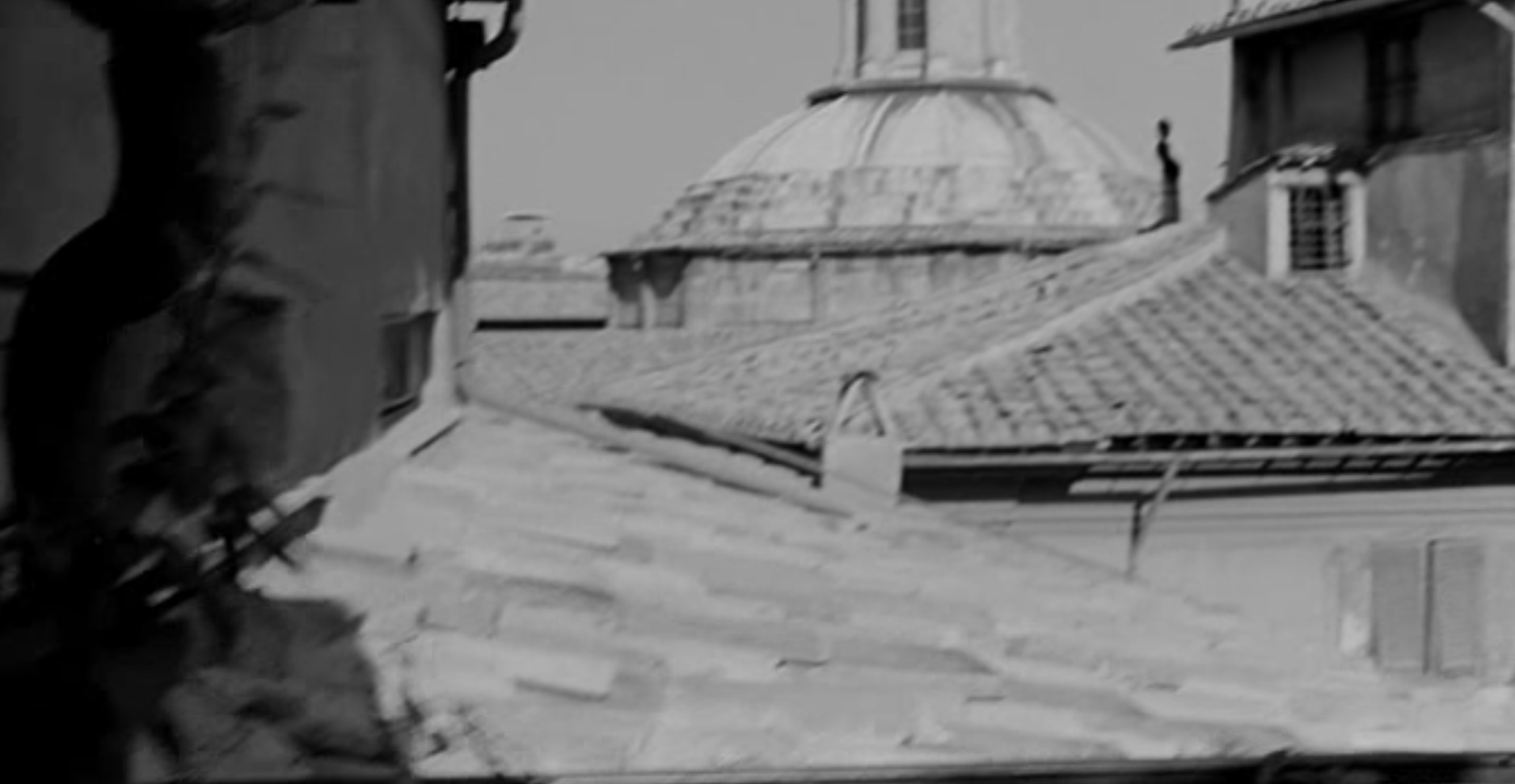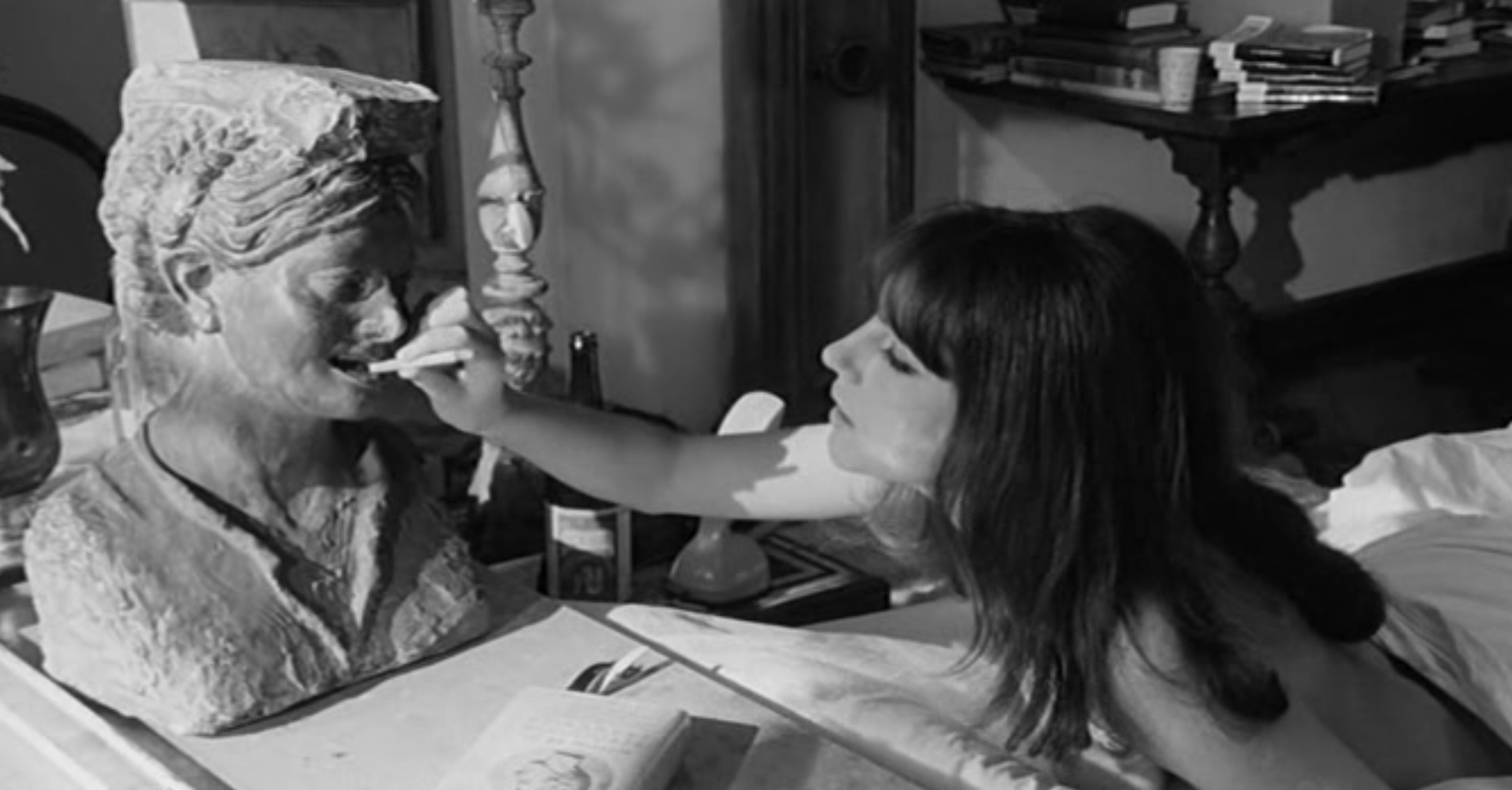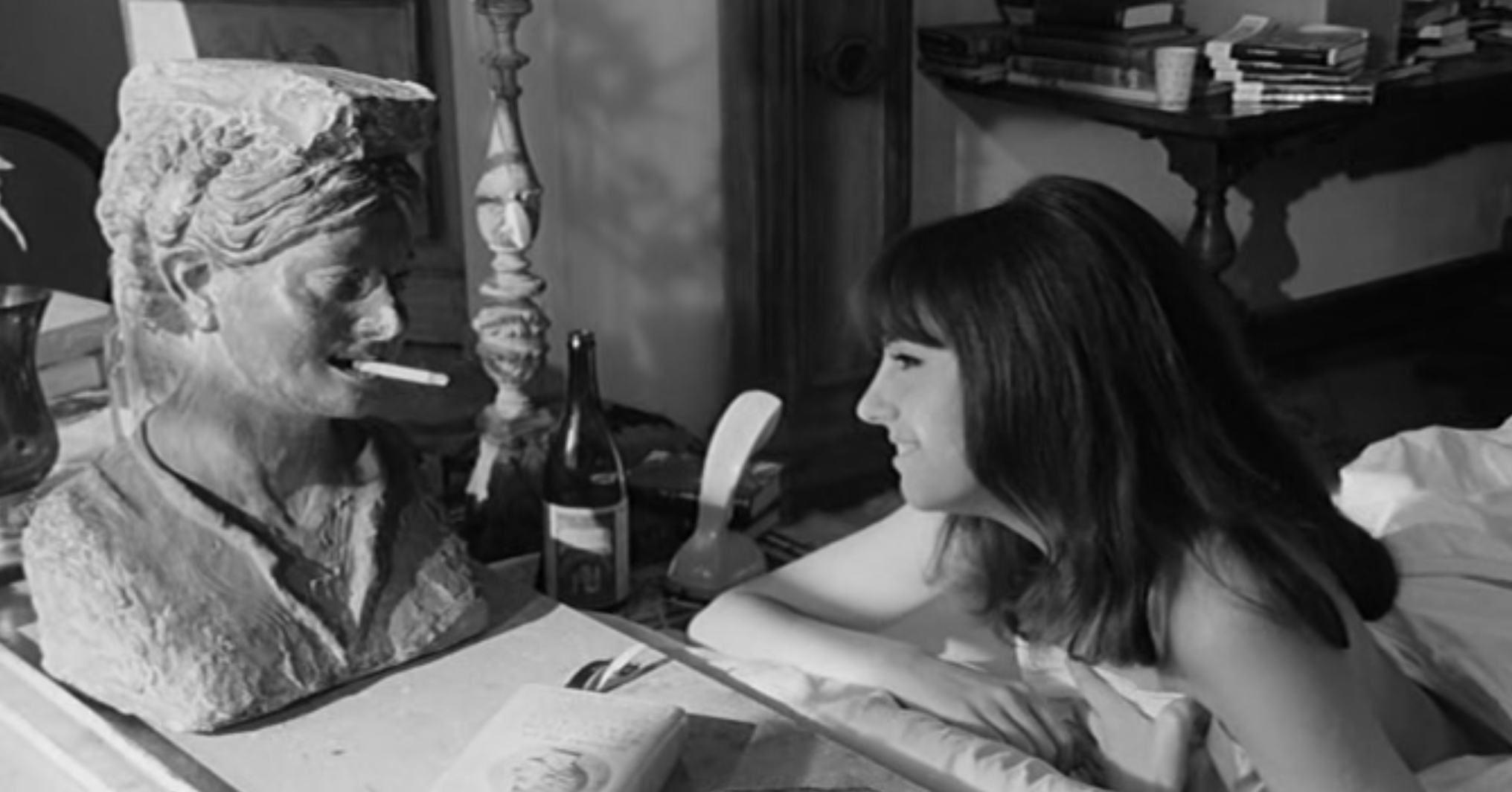Regia / Director: Antonio Pietrangeli, 1965
Le campane di una chiesa suonano. La macchina da presa inquadra un tetto di tegole e due cupole. Quindi fa una panoramica fino a una finestra, dove vediamo Adriana.
Church bells ring. The camera frames a tiled roof and two domes. Then it pans over to a window, where we see Adriana.
Poi la macchina da presa zooma mentre lei canta – in un inglese fortemente accentato – "Amo il dolce William". È la canzone su cui lei e Dario hanno ballato prima.
Amo il dolce William
Sì, è il mio ragazzo
E io sono la sua bambolina
Il suo giocattolo preferito
Mentre canta, agita la sigaretta per tenere il tempo.
Then the camera zooms in as she sings – in heavily accented English – “I Love Sweet William.” It’s the song she and Dario danced to earlier.
I love sweet William
Yes, he's my boy
And I'm his little doll
His favorite toy
As she sings, she waves her cigarette to keep time.
Infila la sigaretta tra le labbra di un busto scultoreo e ammira l'effetto. I suoi capelli pendono sciolti sulle spalle.
She slips the cigarette between the lips of a sculpture bust and admires the effect. Her hair hangs loosely over her shoulders.
Guardando un orologio da polso, sente il rintocco di un orologio a pendolo: le nove. Urla: "Che ora fai?"
Peering at a wristwatch, she hears the chime of a grandfather clock: nine o’clock. She calls out, “What time do you have?”
Non c'è risposta. Prende il telefono bianco al lato del letto e digita un numero.
"Sono le nove e ventisei", risponde una voce automatica.
No answer. She picks up the white telephone at the bedside and dials.
“The time is nine twenty-six,” an automated voice answers.
Avvolgendosi in un lenzuolo, si alza e si avvicina a un tavolo carico di libri e documenti. Un uomo in vestaglia bianca (Joachim Fuchsberger) esce dal bagno, ancora un po' bagnato. "Hai detto qualche cosa?"
Da fuori campo, lei risponde: "Quando? Non mi ricordo".
Wrapping herself in a sheet, she gets up and walks over to a table laden with books and papers. A man in a white robe comes out of the bathroom, still a little wet. “Did you say something?”
From off-screen, she replies, “When? I don’t remember.”
Si avvicina a una scatola di cartone piena di copie dello stesso libro, 21 racconti. Ne prende una e la apre sorridendo.
She goes to a cardboard box full of copies of the same book, 21 Short Stories. She takes one out and opens it, smiling.
Girandosi verso di lui, dice: "Dopo mi ci fai l’autografo, eh?" Lui ha già lasciato la stanza. "Certo che il tuo è un bel mestiere. Dà soddisfazione".
Turning toward him, she says, “Later you’ll autograph one for me, okay?” He’s already left the room. “You really have a great profession. It gives you satisfaction.”
"Ah, ho visto una fotografia tua su Paese Sera!"*
Notiamo un altro telefono bianco sul muro.**
*Un giornale vicino al Partito Comunista Italiano che, a differenza dei giornali di destra dell'epoca, includeva intrattenimento e altri contenuti leggeri accanto a quelli politici.
**Un riferimento al genere italiano dei film dei telefoni bianchi degli anni Trenta e Quaranta: si trattava di commedie leggere e senza contenuti sociali seri, girati in appartamenti art déco di persone ricche. I loro telefoni bianchi contrastano nettamente con i telefoni neri dell'italiano comune.
“Oh, I saw a photograph of you in The Country in the Evening!”*
We notice another white telephone on the wall.**
*A newspaper close to the Italian Communist Party, which, unlike the right-wing papers of the time, included entertainment and other light features as well as political content.
**A reference to the Italian genre of white telephone films in the 1930s and 1940s: they were light comedies without serious social content, shot in the art deco apartments of wealthy people. Their white telephones contrast strikingly with the black telephones of the average Italian.
Lei cammina, con il libro aperto in mano. "Trecentoventi pagine! Scrivi molto, tu, eh?"
"Come tutti quelli che non hanno niente da dire", risponde lui senza guardarla. Poi prende in mano un quadro.
She walks, open book in hand. “Three hundred and twenty pages! You write a lot, don’t you?”
“Like everyone who has nothing to say,” he replies without looking at her. Then he picks up a painting.
Lei si gira. "Cosa intendi?"
"No, niente. Non preoccuparti", risponde lui da fuori campo.
She turns. “What do you mean?”
“No, nothing. Don’t worry about it,” he answers from off-screen.
Lei posa il libro su un tavolino, lontano dalla scatola in cui l'ha trovato. "Ma non hai una radio?"
Lo sentiamo martellare la cornice del quadro.
She sets the book down on a small table, far from the box where she found it. “Don’t you have a radio?”
We hear him hammering at the picture frame.
Lui alza lo sguardo per un breve momento, scuote la testa e torna al suo lavoro.
Looking up for a brief moment, he shakes his head, then returns to his work.
"Perché?" chiede lei.
Lui, ancora intento nel suo compito, risponde: "Le canzonette mi danno ai nervi. Il sapone e il dentifricio li scelgo da me".
“Why?” she asks.
Still intent on his task, he replies, “Pop songs get on my nerves – and I choose my own soap and toothpaste.”
Prendendo un ventilatore elettrico, lei sospira con piacere mentre la brezza le colpisce il viso. Si avvicina alla finestra.
Picking up an electric fan, she sighs with pleasure as the breeze hits her face. She walks over to the window.
Si siede alla finestra aperta, il ventilatore le scompiglia i capelli. "Sai ballare?" chiede.
"No".
"Nuotare?"
“No”.
Lei ride. "Ma allora che sai fare?"
Lui la guarda per un attimo, poi risponde: "Niente".
She sits at the open window, the fan tousling her hair. “Do you know how to dance?” she asks.
“No.”
“Swim?”
“No.”
She laughs. “Then what can you do?”
He looks at her for a moment, then answers: “Nothing.”
Lei abbassa lo sguardo, forse imbarazzata, riflette per un attimo. "Beh, non sono mica poi cose tanto importanti". Scende dalla finestra.
Looking down, perhaps embarrassed, she ponders for a moment. “Well, it’s not like those things are so important.” She gets down from the window.
Quando appoggia il ventilatore su un tavolo, la brezza mette in movimento un foglio dentro la macchina da scrivere. Lei lo estrae e lo legge ad alta voce.
When she puts the fan down on a table, the breeze sets in motion a piece of paper in the typewriter. She pulls it out and reads it aloud.
"Oggi un'esperienza singolare. Incontrata Milena, ragazza bella, eccitante". Si ferma e alza lo sguardo. "Chi è Milena?"
Lei è ritratta in un'elegante composizione, tra due finestre. Una fila di piccoli cuscini attira lo sguardo all'interno dell'inquadratura.
“Today I had a unique experience. Met Milena, beautiful girl, exciting.” She stops and looks up. “Who’s Milena?”
She’s pictured in an elegant composition, between two windows. A row of small cushions draws the eye into the frame.
Ancora concentrato sul quadro, lui le rivolge uno sguardo. "Nessuno. Lascia stare".
Still focused on the painting, he glances back at her. “Nobody. Leave that alone.”
"E la metti in un libro?"
Anche se impegnato con il quadro, la guarda di nuovo.
“And you’re putting her in a book?”
Though busy with the painting, he looks at her again.
He tosses the hammer on the table. “Maybe.” Annoyed, he walks over and snatches the paper from her hand. “I told you, leave that alone.”
Getta il martello sul tavolo. "Forse". Infastidito, si avvicina e le strappa il foglio dalla mano. "Ti ho detto di lasciarlo stare".
"Perché?"
Lui la spinge da parte. "Perché non ti riguarda. È una come tante altre".
“Why?”
He pushes her aside. “Because it doesn’t concern you. She’s one like so many others.”
Lui si mette una sigaretta tra le labbra e l'accende. Dall'altra parte della stanza, lei dice: "Scommetto che te la sei portata a letto".
Lui si allontana e commenta: "Con ragazze come lei, non è un problema dopotutto".
He puts a cigarette between his lips and lights it. From far across the room, she says, “I bet you took her to bed.”
Walking away, he comments, “With girls like that, it’s not really a problem.”
Lei crolla sul letto, sorridendo. Vediamo il suo volto in primo piano, contro il copriletto bianco. "Beh, si vede che le piacevi".
She collapses onto the bed, smiling. We see her face in close-up, against the white bedspread. “Well, she must have liked you.”
"Le piacevo?" Lui sta appendendo il quadro. Ora lo vediamo: è astratto. "Sì, può darsi. Ma il fatto è che le va bene tutto. È sempre contenta. Non desidera niente, non invidia nessuno..."
“Liked me? ” He’s hanging the painting. We see it now: it’s abstract. “Yes, it could be. But the fact is that she’s okay with everything. She’s always happy. She desires nothing, envies no one– ”
"– è senza curiosità". Le lancia un'occhiata. "Non si sorprende mai. Le umiliazioni non le sente. Eppure, povera ragazza, gliene capitano tutti i giorni. Le scivola tutto addosso senza lasciare traccia".
“– is without curiosity.” He glances at her. “She’s never surprised. She doesn’t feel humiliations. Though, poor girl, they happen to her every day. It all slides right off her without leaving a trace.”
Mentre continua la sua fredda valutazione, vediamo la schiena nuda di Adriana, il lenzuolo bianco ancora avvolto intorno a lei. "Ambizione: zero. Morale: nessuna. Neppure quella dei soldi, perché non è nemmeno una puttana".
Lei si rotola sulla schiena, si stiracchia e ridacchia: "Che parole!"
As he continues his cold assessment, we see Adriana’s bare back, the white sheet still wrapped around her. “Ambition: zero. Moral code: none. Not even that of money because she’s not even a whore.”
She rolls on her back, stretches, and chuckles: “What words!”
Adriana si mette il copriletto sul viso. Ma lui non ha finito. "Per lei ieri e domani non esistono. Non vive neanche giorno per giorno perché già questo la costringerebbe a fare programmi troppo complicati. Quindi vive minuto per minuto".
Adriana puts the bedspread over her face. But he’s not finished. “For her, yesterday and tomorrow don’t exist. She doesn’t even live day to day because that would force her to do complicated planning. So she lives minute by minute.”
Ascoltando, lei abbassa gradualmente il copriletto. "Prendere il sole, sentire i dischi e ballare sono le sue uniche attività. Per il resto è incostante e capricciosa, ha sempre bisogno di incontri nuovi e brevi".
Listening, she gradually lowers the spread. “Sunbathing, listening to records, and dancing are her sole activities. The rest of the time, she’s changeable and capricious, she always needs new and brief encounters.”
"Non importa con chi, con se stessa mai".
Le campane della chiesa suonano.
Infine, lei chiede: "Milena sono io, vero?"
“It doesn’t matter with whom, never with herself.”
Church bells ring.
Finally, she asks, “Milena is me, right?”
Lui tira una boccata di sigaretta, senza rispondere.
He takes a drag on his cigarette, without responding.
"Sono così? Una specie di… deficiente?"
“Am I like that? Some kind of imbecile?”
Lui si china su di lei. "Ma no, al contrario. Forse sei tu la più saggia di tutti".
He leans over her. “No, on the contrary. You may be the wisest of all.”
Infine, lo scrittore abbassa il copriletto e bacia la schiena di Adriana che giace inerte e infelice.
At last, the writer pulls down the bedspread and kisses Adriana’s back as she lies inert and unhappy.
FINE PARTE 13
Ecco Parte 14 of this cineracconto! Subscribe to receive a weekly email newsletter with links to all our new posts.













































































